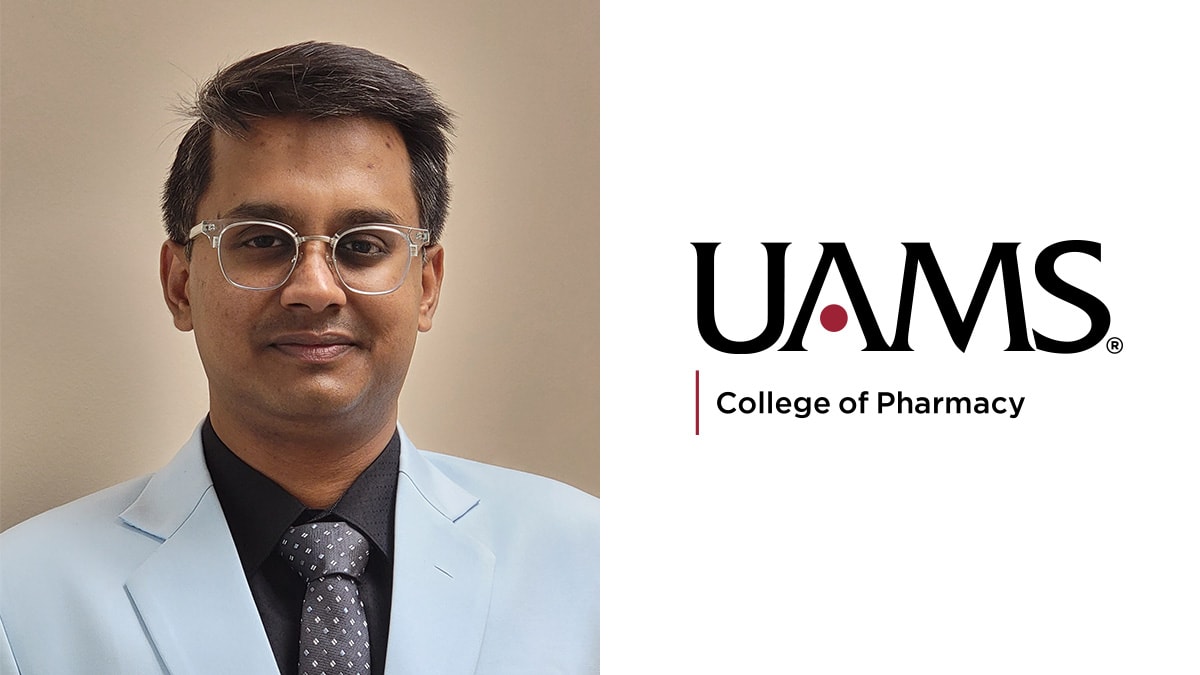College of Pharmacy Graduate Student Receives Prestigious AHA Predoctoral Fellowship
| Soumiya Pal, M.Sc., a Ph.D. candidate in the UAMS College of Pharmacy, likes to dream big. Recently, a dream that seemed out of reach finally came true, when he was recently awarded the American Heart Association’s (AHA) Predoctoral Fellowship.
The one-year fellowship includes a stipend, health insurance and project support totaling $32,553. According to the AHA, these fellowships aim to enhance the integrated research and clinical training of promising students in predoctoral or clinical health professional degree programs who intend careers as scientists or clinician-scientists, or related careers aimed at improving global cardiovascular, cerebrovascular and brain health.
“As a student, getting a fellowship award like this makes you stand out from the crowd because it is highly competitive and has a low success rate,” Pal said. “So for me being an academic career aspirant, it was a dream come true moment. This fellowship is of utmost importance for achieving my long-term goal of being an independent project investigator.”
Pal initially applied for the fellowship in 2021 but was unsuccessful. So, he tried again, addressing issues raised by the review, and resubmitted last year. This time, it was good news.
“This predoctoral fellowship has only a 26% success rate, so we are very excited that Soumiya’s application was chosen for funding,” said Amanda Stolarz, Pharm.D., Ph.D., assistant professor in the Department of Pharmaceutical Sciences and Pal’s primary mentor. “He worked really hard collecting the preliminary data and putting everything together. I am very proud of his success.”
Pal’s project focuses on how high blood pressure, also called hypertension, may contribute to the development of lymphedema after cancer treatment. Lymphedema, the buildup of fluid inside tissue gaps, is a major complication of cancer and cancer treatment. Cancer-related lymphedema affects 1 in 1,000 patients in the United States each year. It is considered a lifelong disease that can lead to disfigurement, immobility and recurrent hospitalization due to infections.
Understanding risk factors and their impact on the human lymphatic system can help scientists design potential drug therapies to treat or prevent the condition.
The potential link between high blood pressure and lymphedema has not been explored much and is an emerging concept in research, Stolarz said. “Based on clinical data, hypertension is a risk factor, but how it happens is unknown. Does hypertension itself cause changes to the lymphatic system, or is the risk with hypertension medication, or a combination of both?”
That’s where Pal’s project comes in. Establishing how hypertension affects the lymphatic system could lead to better outcomes for cancer patients undergoing treatment.
“Hypertension could be a modifiable risk factor for cancer-related lymphedema,” Stolarz said. “So, if we were able to treat hypertension appropriately in these patients, this could reduce the risk of developing lymphedema without interfering with cancer treatment.”
Pal’s application received enthusiastic endorsements from the Department of Pharmaceutical Sciences, including chair John Imig, Ph.D., and associate professor Antiño Allen, Ph.D.
“Soumiya is conducting exciting research, and this fellowship recognizes his outstanding abilities as a graduate student and the importance of his research,” Imig said. “It is a pleasure and honor to have him as part of the Department of Pharmaceutical Sciences.”
“Soumiya is a very bright and self-motivated researcher,” Allen said. “As graduate program director, I am pleased to see him progressing on time despite pandemic-related setbacks.”Additional UAMS researchers are assisting on Pal’s project. Shengyu Mu, M.D., Ph.D., associate professor in the College of Medicine’s Department of Pharmacology and Toxicology, is co-sponsor, and Nancy Rusch, Ph.D., distinguished professor and chair of the Department of Pharmacology and Toxicology, is a collaborating investigator. Pal also credited Marjan Boerma, Ph.D., professor of pharmaceutical sciences, who served on his dissertation advisory committee, and Philip Palade, Ph.D., professor of Pharmacology and Toxicology, who provided him with the letter of recommendation.
“I am certain of the feasibility and importance of this project, and I believe conducting this research as an AHA Fellow will prepare me to embark on an intense period of research and career development,” Pal said.
